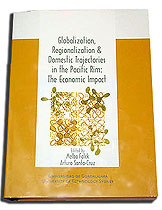|
Globalization, Regionalization & Domestic Trajectories in the Pacific Rim:
The Economic Impact
Vol. 1
Edited by
Melba Falck and Arturo Santa Cruz
 | | |
This first volume of the series Pacific Rim: Globalization, Regionalization, and Domestic Trajectories highlights the heterogeneous effects of the twin processes of globalization and regionalization on the domestic trajectories of a diverse set of countries in the Pacific Rim. It is divided into four sections. The first is about "Regionalism and Domestic Trajectories." The two Chapters here in Emphasize the links between national regimes and regionalism, as well as the effects regional integration has on domestic structures. Both inquire into its consequences in a particularly enlightening fashion , problematizing first the imputed causal factor: the region itself. Furthermore, these chapters question the idea of regional integration as chiefly en economic matter. In the authors' view, economic projects are always embedded in wider political and societal trends.
The second sections deals with the area in which globalization has unmistakably proceeded further: the financial sector. If globalization has been succesful in one are, this has been it. The two chapters in this section focu on the experience with financial liberization on both sides of the Pacific, tracing the domestic trajectories of six countries. The discussion of capital account liberalization is prominent in both chapters, but they look at it from different angles.
In the third section, on "International integration and Domestic Trajectories", three chapters are dedicated to analyze how deeper international integration, through flows of trade and investment, has affected the domestic trajectories of the economies of China, Vietnam and Mexico, and how they are dealing with greater openness.
The last section of the book considers one of the most "sensitive" areas to international integration: the agricultural sector. It focuses on the effects of globalization and integration on domestic agricultural policies of two important players in international food markets: Japan, which has become the major importer of food in the world and China, whose reforms to a more market-oriented economy have actively promoted its integration into the international food markets over the last two decades.
Índice /Notes on contributors /Foreword /Introduction /Section I: Regionalism and Domestict Structures /Ambivalent Regionalism is Southeast Asia /Regional Integration and Dis-integration in the Pacific: Economic Articulations /Section II: Globalization and financial Liberalization /Money Matters: Financial Globalization and capital controls in Chile and Malaysia /Liberalization, Globalization, and Financial Structuresin Four Apec Economies: Mainland China; South Korea, México and Perú /Section III: International Integration and Domestic Trajectories /Openness and inequality: Can China compensate the losers of its WTO Deal? /Regional Integration in a former centrally Planned Economy: The Role of FDI in the formation of markets institutions in Vietnam /NAFTA and the Dynamics of US-Mexico Economic Integration /Section IV: International Integration and Domestic Agricultural Policies /China's Agricultural Poicy for the 21st Century: it's influence on international grain markets /Agricultural Policy in Japan: An internal and External Paradox /UdeG, 2000, 269 pp.
______________________________________________________

Coordinación de Tecnologías para el Aprendizaje
| 
